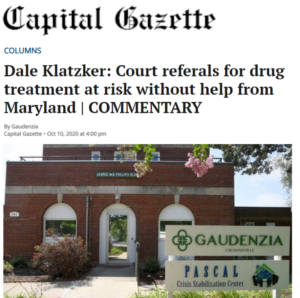
Gaudenzia
Advocacy
Issues Management
 The Challenge
The Challenge
Gaudenzia and the state of Maryland have been long-time partners through an innovative program known as 8-507, which allows those accused or convicted of non-violent crimes to seek treatment for drug and alcohol addiction in exchange for having their sentences reduced or even eliminated. During the height of the COVID-19 pandemic, however, 8-507 referrals dried up due to closed courts, creating a deficit of more than $3 million for Gaudenzia, a crippling amount for a nonprofit. Without financial help from the state, it was likely that Gaudenzia would need to reduce services or close treatment centers in the state – a dire scenario for the organization and the people it serves, especially as the need for addiction services was only increasing given the anxiety and isolation brought on by the pandemic.
The Approach
D+P worked with Gaudenzia’s corporate and lobbying teams to establish objectives and develop a strategy aimed at raising awareness of the issue among key stakeholders, including the governor’s office, department of health, and key legislators. D+P developed a media campaign that resulted in news feature stories in the Baltimore Sun and the Capital-Gazette (Annapolis) newspapers. D+P also produced op-eds by Gaudenzia’s CEO for each publication and for use on its website and social media channels. Then, when another advocacy group challenged Gaudenzia in the Baltimore Sun, D+P led an effort to rebut the other group’s claims in an op-ed in the Sun. D+P also designed and produced information decks used in presentations with the governor and other high-level government officials.
 The Results
The Results
Gaudenzia received the government funding it sought and was able to continue its operations in Maryland. The awareness campaign also raised the organization’s profile in Maryland as a willing partner in the efforts to help those with substance use disorder.
Here’s a sampling of the coverage:
- Dale Klatzker: Court referals for drug treatment at risk without help from Maryland | Capital Gazette
- Police charge fewer people amid COVID, changing mores. Upshot: Maryland drug treatment centers reel from lack of funds | The Baltimore Sun
- Dale Klatzker: Court referals for drug treatment at risk without help from Maryland | Capital Gazette
- Gaudenzia: Partnering with justice system necessary for effective addiction treatment | The Baltimore Sun
